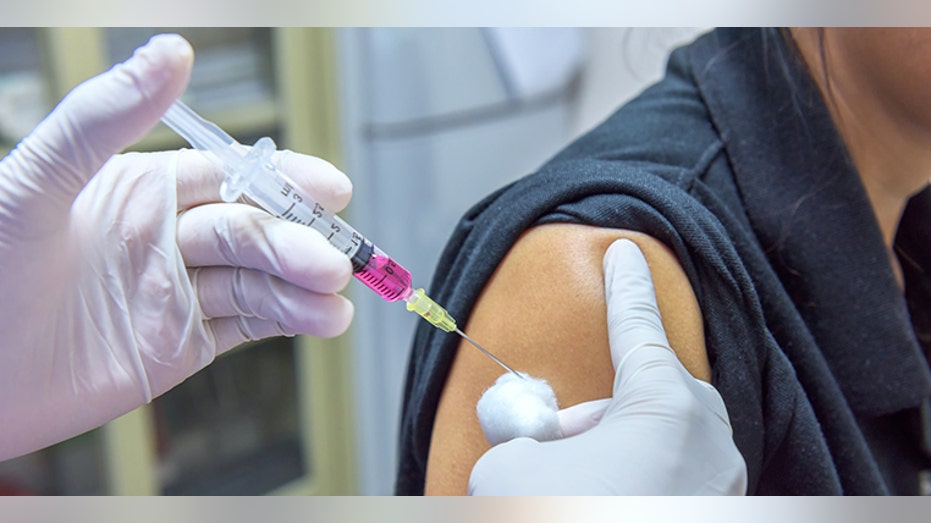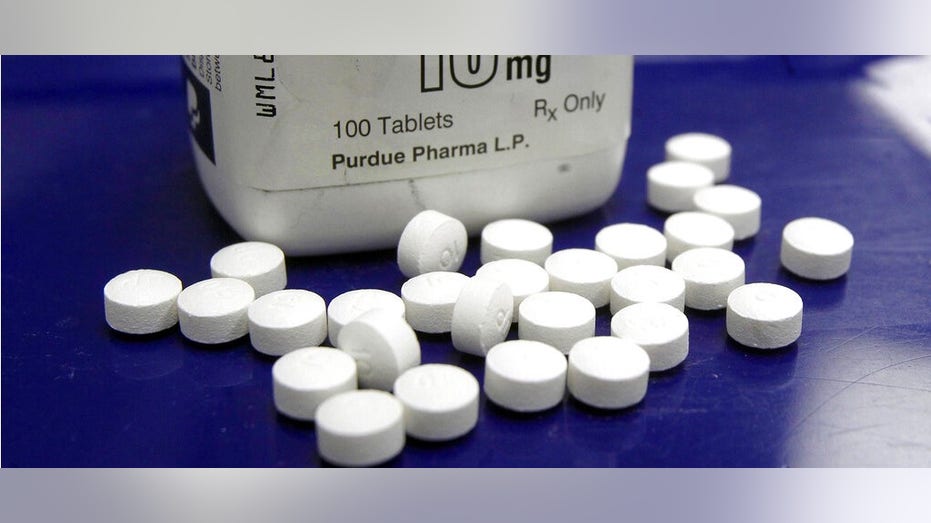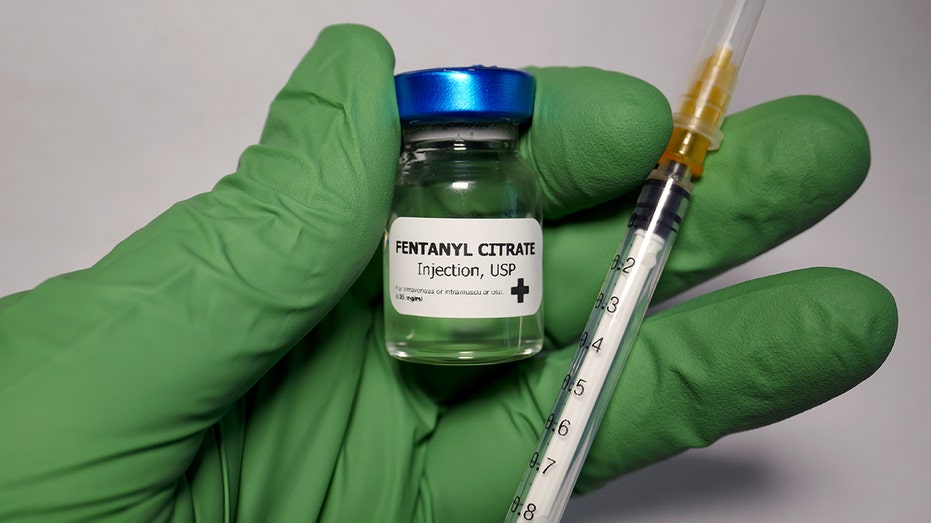Rhode Island set to be first state to pilot safe-injection sites for drug users
Overdose deaths are the leading cause of accidental death in the country
Opioid epidemic was made 'much worse' during pandemic: Narcan inventor
Dr. Roger Crystal, CEO of Opiant Pharmaceuticals and inventor of Narcan, says the best way to combat the opioid epidemic is to reduce demand and previews a new opioid rescue medicine.
Rhode Island plans to create supervised spaces for users to inject illegal drugs, in a big test of the idea that reducing harm to drug users is more effective than criminalization.
The two-year pilot, a first for a state, would establish sites where users could also have drugs tested for potentially fatal doses of fentanyl, the potent synthetic opioid that drove overdose deaths to a nationwide record in 2020.
States including Massachusetts and California are considering similar sites. Some cities have attempted to legalize supervised-injection sites, including Philadelphia, where one was blocked from opening under a legal challenge from the Trump administration.
Such injection sites allow people to use drugs including heroin and methamphetamine, under the supervision of trained personnel. In the event of an overdose, staff can administer the antidote naloxone. Advocates say the sites prevent overdose deaths and provide an access point to other services that can help prevent harm to users, such as housing, medical care and treatment.
Critics say there is no evidence the sites significantly reduce illegal drug use or dependency. Rhode Island State Rep. Arthur Corvese, a Democrat, said it doesn’t make sense to set rules for most people and then create a space for some to break them. "There’s almost like a moral oxymoron going on here," he said.

Close-up hands,nurses are vaccinations to patients using the syringe.Doctor vaccinating women in hospital.Are treated by the use of sterile injectable upper arm. injection
Operators of the Philadelphia site, called Safehouse, are asking a federal judge for the Eastern District of Pennsylvania to reconsider arguments in favor of its opening. The Justice Department wouldn’t say whether the Biden administration would argue against Safehouse’s request.
APPEALS ARE MOUNTING IN PURDUE PHARMA BANKRUPTCY SETTLEMENT
Rhode Island’s planned safe-use sites may have greater success in facing down a federal challenge because states have more authority than cities to set drug-enforcement policy, legal experts say. Advocates for so-called harm-reduction policies say Rhode Island’s law is the most direct test yet of the idea that legal-consumption sites can reduce overdose deaths and harm to drug users.
"We’ve been historically a country that addresses a health condition with punishments," said Suzanne Carlberg-Racich, associate professor of public health at DePaul University in Chicago.
Rhode Island State Rep. Edith Ajello, a Democrat, said the death of her best friend’s son to an overdose during the pandemic helped convince her that safe-use sites would help prevent deaths across the state.
"Supervised consumption sites can help to cut these losses," she said.
Overdose deaths are the leading cause of accidental death in the country, killing more people than car crashes. Such deaths surged nearly 30% in 2020 due to a deadlier drug supply and the destabilizing effect of the Covid-19 pandemic, according to federal data and public-health officials.
One would-be user of the planned sites in Rhode Island, Lee McDaniel, 51 years old, said he has used drugs on and off for more than a decade. He said that he has ended up in dangerous, abusive and potentially fatal situations to hide his drug use.
"We are forced to put ourselves in positions where the choices we have to make all degrade, deface and strip down our human dignity," he said.
IN QUIET DEBUT, ALZHEIMER’S DRUG FINDS QUESTIONS, SKEPTICISM
Countries including Canada and the Netherlands have established similar safe-use sites. In Toronto, Shaun Hopkins said the site she helps manage has helped users get treatment, housing and medical care. She said some users come to the site up to four times a day.
Critics, including some lawmakers in Rhode Island, say the sites are enabling drug use. Supporters say ending drug dependence doesn’t follow a linear pattern and point to increases in enrollment in detoxification programs in places where supervised injection sites have been introduced.

Under the Biden administration, the Office of National Drug Control Policy, which under previous administrations focused on drug criminalization, has named harm reduction as a priority for the first time.
"Language is the first step. But true investment and support is actually what’s needed," said Ellen Glover, campaign director for drug policy, harm reduction and criminal justice at People’s Action, a collective of some 40 organizations including some working to reduce overdose deaths.
The Substance Abuse and Mental Health Services Administration this year added $30 million in federal support for harm-reduction services, and the Drug Enforcement Administration lifted a decadelong moratorium on mobile opioid-treatment programs. The administration has also proposed that Congress remove mandatory minimum sentencing for possession of fentanyl-related substances.
Meanwhile, harm-reduction advocates criticize the Biden administration’s support of a Trump-era policy that applied the stiffest criminal penalties for drug offenses to fentanyl-related substances. The number of people convicted of trafficking fentanyl-related drugs increased 160% since the harsher penalties were enacted in 2018, according to the U.S. Sentencing Commission.
Some 40% of illegal drugs tested for fentanyl contained a potentially lethal dose of at least 2 milligrams, the DEA said. The synthetic opioid can produce a similar effect to morphine but can be up to 100 times more potent, according to the DEA.

Fentanyl - a substance that acts on opioid receptors and is primarily used for pain relief and anesthesia.
Rhode Island is set to codify rules for operating its supervised injection sites in January and aims to have locations agreed upon locally by March. Some public-health advocates in Rhode Island are concerned about how the safe-use sites will operate without public funding. A spokesman for Medicaid said the program doesn’t make payment for the administration of controlled substances that are illegal under federal law.
GET FOX BUSINESS ON THE GO BY CLICKING HERE
Amy Nunn, executive director of the Rhode Island Public Health Institute, the nonprofit working to open a safe-consumption site in Providence, said it isn’t clear how the site will obtain malpractice insurance or whether Medicaid will cover costs of treating users there. She said her group would pursue private donations and other sources of funding for the site.
"People will put up a lot of roadblocks," she said. "There’s just so much stigma associated with using drugs."




















